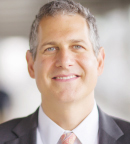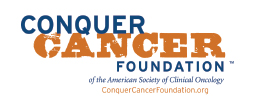
Ethan Basch, MD, MSc
In most cases, oncology doctors and nurses only assess their patients’ symptoms during regular checkups. Between visits, patients typically report symptoms only if there is a more severe problem. A study, funded in part by the Conquer Cancer Foundation (CCF) of ASCO, suggests increased communications between patients and health-care providers could lead to improved outcomes for patients with advanced cancer.
During the Plenary Session of the 2017 ASCO Annual Meeting, Ethan Basch, MD, MSc, Director of the Cancer Outcomes Research Program and Professor of Medicine and Public Health at University of North Carolina, presented research that compared patients who consistently self-reported symptoms to their doctors using an online tool with those who reported symptoms mainly during office visits.
The study showed an overall increase in positive outcomes for the group who communicated symptoms using the online tool. Participants, who had advanced and highly symptomatic metastatic cancers, reported details on 12 common symptoms while receiving chemotherapy. The patients accessed the tool either from their home computer or from a tablet housed at a kiosk available at a scheduled office visit. Nurses received e-mail alerts when patients reported severe or worsening symptoms.

Patients who used the online tool to regularly report symptoms lived a median of 5 months longer than those who did not use the tool (31.2 months vs 26 months). Patients who used the online tool also had a better quality of life, reduced emergency room visits and hospital stays, and were able to tolerate chemotherapy treatment longer.
Evidence on patient-reported symptom monitoring outcomes is limited, but there is growing interest in the process, which Dr. Basch believes is efficient and effective.
“It’s simply better care,” said Dr. Basch, who compares the modern-day interaction to when physicians made house calls. “The early symptom intervention kept people more functional and we were able to catch problems before they got out of hand.”
The study followed 766 patients at Memorial Sloan Kettering Cancer Center, but the findings are now being confirmed in a larger clinical trial of community practice patients from across the United States. Updated software allows patients to use personal computers, tablets, and smartphones for reporting symptoms.
“Part of the ongoing research is to look at how this can be [implemented] for both patients and nurses,” Dr. Basch said. In the future, he will also track how increased patient interaction factors into the workload of health-care providers.
In 2006, Dr. Basch received a Career Development (CDA) from CCF to expand his work in outcomes research. To support other researchers like Dr. Basch, donate to the Conquer Cancer Foundation of ASCO. ■
© 2017. American Society of Clinical Oncology. All rights reserved.

